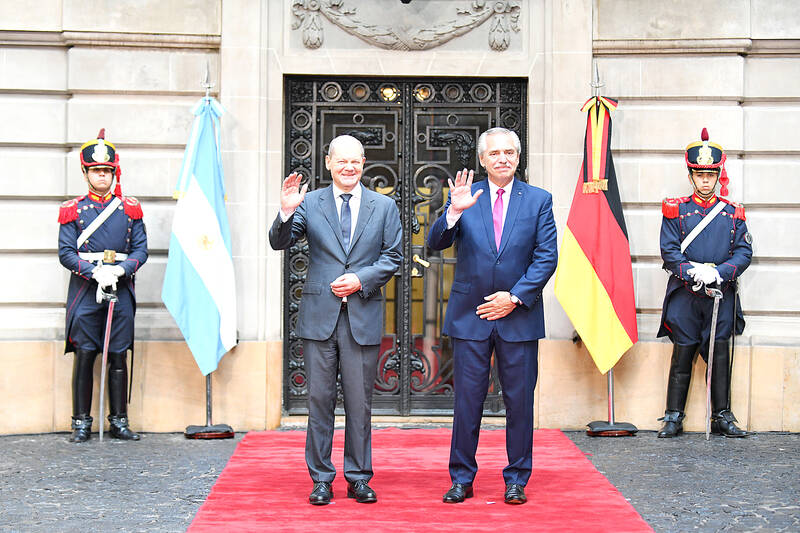German Chancellor Olaf Scholz on Saturday urged a swift conclusion to talks on a free trade deal between the EU and the Mercosur South American trade bloc during a stop in Buenos Aires on his inaugural tour of the region.
Seeking to reduce Germany’s economic reliance on China and diversify trade with democracies worldwide, Scholz is visiting Argentina, Chile and Brazil, all led by fellow leftists who came to power in the region’s new “pink tide.”
Berlin wants to lower its dependence on China for minerals key to its energy transition, making resource-rich Latin America an important partner. The region’s potential for renewable energy output is another attraction.

Photo: EPA-EFE
“There is great potential to further deepen our trade relations, and the possibilities that could come from the EU-Mercosur deal are obviously particularly significant,” Scholz told a news conference alongside Argentine President Alberto Fernandez.
Fernandez has blamed European protectionism for delaying the deal, agreed to in principle in 2019, but not ratified by national parliaments.
EU ambassadors have said Brazil must take concrete steps to stop soaring destruction of the Amazon rainforest.
Berlin hopes that the concern can be put aside with the election of Brazilian President Luiz Inacio Lula da Silva, who has promised to overhaul the country’s climate policy. Scholz is to meet him today at the end of his three-day tour.
Russia’s invasion of Ukraine, which sparked an energy crisis in Germany due to its heavy reliance on Russian gas, increased awareness of the need to reduce economic reliance on authoritarian states.
For Germany to reduce its reliance on China for minerals, it must embrace sectors it has shied away from, a German government official said on Friday.
“For example, lithium mining — that’s a challenging task, especially regarding the environment and social standards,” the official, traveling with Scholz, told reporters.
Argentina and Chile sit atop South America’s “lithium triangle,” which holds the world’s largest trove of the ultra-light battery metal.
Several business executives — including the heads of Aurubis AG, Europe’s largest copper producer, and energy company Wintershall Dea AG — are accompanying the chancellor.
Fernandez said he and Scholz discussed the possibility of attracting German investment to the country’s vast shale gas reserve, lithium deposits and green hydrogen production.
Wintershall Dea, for example, is part of a consortium that in September last year announced it was investing about US$700 million to develop a gas project off the coast of Argentina’s southernmost tip, Tierra del Fuego.
“Argentina has the potential to supply Europe with energy in the long term,” Wintershall CEO Mario Mehren said in a statement.

TECH CLUSTER: The US company’s new office is in the Shalun Smart Green Energy Science City, a new AI industry base and cybersecurity hub in southern Taiwan US chip designer Advanced Micro Devices Inc (AMD) yesterday launched an office in Tainan’s Gueiren District (歸仁), marking a significant milestone in the development of southern Taiwan’s artificial intelligence (AI) industry, the Tainan City Government said in a statement. AMD Taiwan general manager Vincent Chern (陳民皓) presided over the opening ceremony for the company’s new office at the Shalun Smart Green Energy Science City (沙崙智慧綠能科學城), a new AI industry base and cybersecurity hub in southern Taiwan. Facilities in the new office include an information processing center, and a research and development (R&D) center, the Tainan Economic Development Bureau said. The Ministry

ADVERSARIES: The new list includes 11 entities in China and one in Taiwan, which is a local branch of Chinese cloud computing firm Inspur Group The US added dozens of entities to a trade blacklist on Tuesday, the US Department of Commerce said, in part to disrupt Beijing’s artificial intelligence (AI) and advanced computing capabilities. The action affects 80 entities from countries including China, the United Arab Emirates and Iran, with the commerce department citing their “activities contrary to US national security and foreign policy.” Those added to the “entity list” are restricted from obtaining US items and technologies without government authorization. “We will not allow adversaries to exploit American technology to bolster their own militaries and threaten American lives,” US Secretary of Commerce Howard Lutnick said. The entities

Minister of Finance Chuang Tsui-yun (莊翠雲) yesterday told lawmakers that she “would not speculate,” but a “response plan” has been prepared in case Taiwan is targeted by US President Donald Trump’s reciprocal tariffs, which are to be announced on Wednesday next week. The Trump administration, including US Secretary of the Treasury Scott Bessent, has said that much of the proposed reciprocal tariffs would focus on the 15 countries that have the highest trade surpluses with the US. Bessent has referred to those countries as the “dirty 15,” but has not named them. Last year, Taiwan’s US$73.9 billion trade surplus with the US

The Taipei International Cycle Show (Taipei Cycle) yesterday opened at the Taipei Nangang Exhibition Center, with the event’s organizer expecting a steady recovery in the industry this year following a tough last year. This year, 980 companies from 35 countries are participating in the annual bicycle trade show, showcasing technological breakthroughs and market development trends of the bicycle industry at 3,600 booths, the Taiwan External Trade Development Council (TAITRA, 外貿協會) said in a statement. Under the theme “Ride the Revolution,” the exhibition has attracted more than 3,500 international buyers from 80 countries to preregister for the four-day event, which is expected to